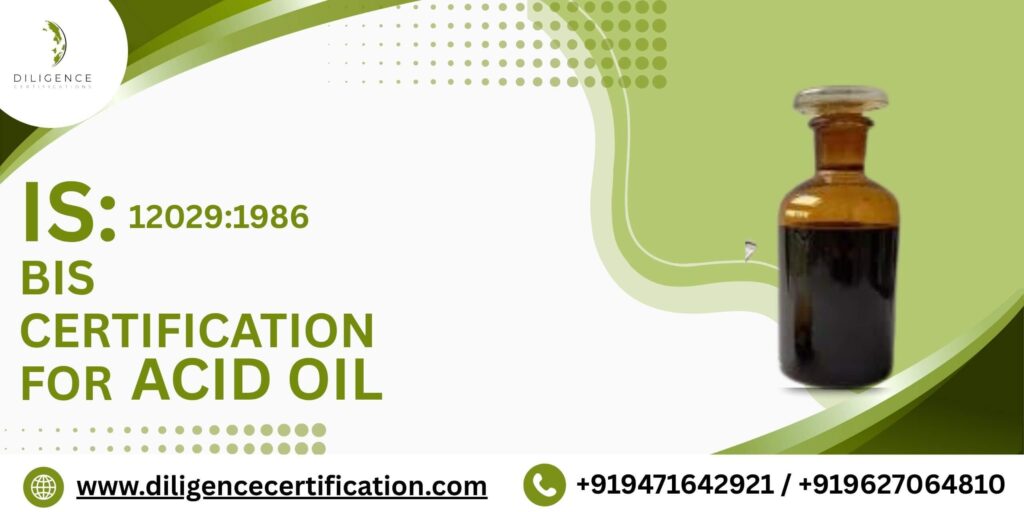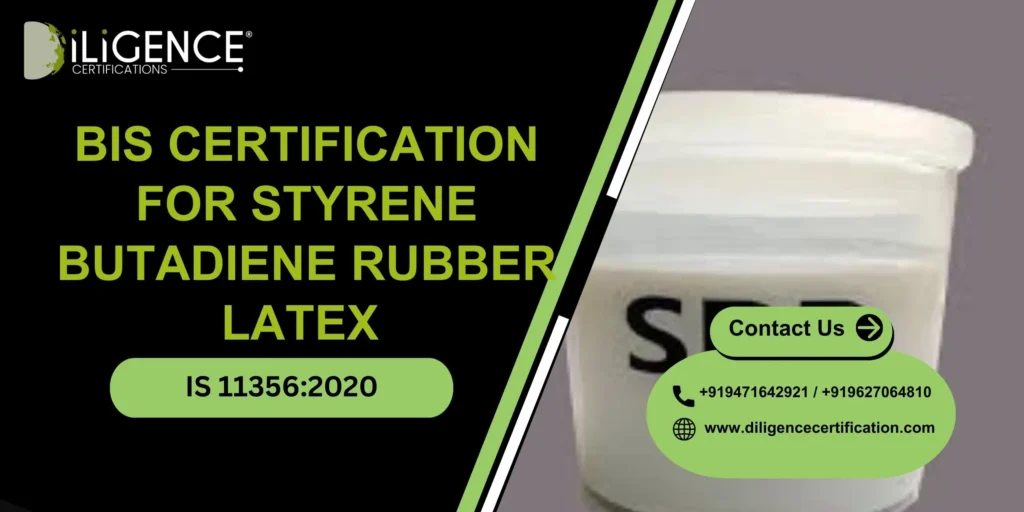- Mandatory for All: As per the latest government order, BIS Certification for acid oil is now compulsory for anyone manufacturing, importing, or selling acid oil in India.
- Based on IS 12029:1986: The acid oil must meet the safety and quality standards defined under Indian Standard IS 12029 to qualify for certification.
- Applies to Every Stakeholder: This rule is not limited to big manufacturers — even small-scale units, traders, and foreign exporters must comply.
- Includes Testing & Inspection: Getting certified involves lab testing, factory audits, proper documentation, and BIS-approved labeling of the product.
- Strict Penalties for Non-Compliance: Products without BIS certification can be blocked at customs, face legal action, or be completely removed from the market.
Introduction

In the modern industrial environment, one can hardly set such processes through quality and safety measures, foregoing the assurance of quality and safety for chemical products. One such product that must strictly comply with Indian quality parameters is Acid Oil. Used in large quantities for soap manufacture, lubricants, and animal feeds, the quality of Acid Oil must satisfy the proper standards laid out by the Bureau of Indian Standards (BIS).
Before 2022, there was no demand for BIS Certification for Acid Oil being marketed in India, but as stated by the Acid Oil (Quality Control) Order, 2022, the sale of the product in India without this certification is now considered illegal. The enforcement of rules on product quality, standards, safety, and packaging is in line with the Indian Standard for Acid Oil-IS 12029:1986.
This blog will offer complete insight into everything required for getting a BIS Licence for Acid Oil, including the latest QCO Amendment of 2025, detailed testing requirements, application procedure, and how Diligence Certifications provides smooth acquisition of an Acid Oil BIS Certificate.
Why BIS Certification for Acid Oil is Mandatory?
In a market where inferior products could failure for businesses and risk consumer health, essentially, the BIS Certification for Acid Oil is the very epitome of quality assurance. It means each of the batches of Acid Oil manufactured or imported or sold in India should comply with IS 12029:1986 specifications under Schedule-II Scheme-I of the Bureau of Indian Standards (Conformity Assessment) Regulations, 2018.
Acid Oil Control Orders have been passed by the Government as a way of saying that it has been made compulsory for all manufacturers to secure the said BIS Licence for Acid Oil, else it cannot be sold in India in any manner.
Why BIS Certification for Acid Oil Matters
- Regulatory compliance & safety: BIS sets stringent norms under IS 5485 for acid oils used in food and feed. Without certification, sales are effectively illegal.
- Market trust: Buyers ask, “Is it BIS‑approved?” Especially brands like Patanjali or Adani Wilmar will only source certified materials.
- Avoid penalties: Customs, FSSAI, and law enforcement impose fines—or even confiscations—on uncertified shipments.
IS 12029:1986 – Indian Standard for Acid Oil

The Indian Standard for Acid Oil (IS 12029:1986) deals in general with testing, packing, and marking of Acid Oil. Here is an overview of the specifications:
Essential Quality Parameters
Acid Oil BIS Certification is given only after the product is certified as complying with the following tests:
- Free Mineral Acid Test
- Oxidized Fatty Acid Content
- Iron Content Test
- Ash Content Determination
The iodine value, which is a measure of unsaturation, is, however, mutually agreed upon between the purchaser and supplier. These specifications ensure that the product is safe, stable, and suitable for industrial purposes.
Packing and Marking Requirements under IS 12029:1986
Proper labeling and packaging are equally important as product quality. Under the Indian Standard for Acid Oil, the packaging must bear:
- Name of the material
- Net mass
- Batch or lot number
- Month and year of manufacture
- Manufacturer’s name and trademark
Optional: ISI Mark (only if the BIS Licence for Acid Oil is obtained)
Containers should be securely sealed and appropriately sized to prevent any contamination or leakage during storage or transit.
Latest Update: Acid Oil QCO Amendment 2025
The Ministry of Chemicals and Fertilizers recently announced an amendment to the Acid Oil (Quality Control) Order, extending the compliance date for manufacturers. The following is the summary of the amendment:
New Enforcement Date: 24th October 2025
This update allows manufacturers more time to prepare their facilities and production processes to comply with IS 12029:1986. However, if they delay, regulatory action can come their way, so it is better to start your certification process without much delay.
What’s new in 2025?
The Department of Chemicals & Petrochemicals, after consultations with BIS, has issued amendments to the QCOs for six fatty‑acid products—pushing the mandatory enforcement date to 24 October 2025 .
Affected Substances & Standards
| Substance | Indian Standard | New Mandatory Date |
| Acid Oil | IS 12029:1986 | 24 Oct 2025 |
| Lauric Acid | IS 10931:1984 | 24 Oct 2025 |
| Palm Fatty Acids | IS 12067:1987 | 24 Oct 2025 |
| Rice Bran Fatty Acids | IS 12068:1987 | 24 Oct 2025 |
| Coconut Fatty Acids | IS 12069:1987 | 24 Oct 2025 |
| Hydrogenated Rice Bran Fatty Acids | IS 12361:1988 | 24 Oct 2025 |
How to Obtain BIS Licence for Acid Oil?
The procedure to obtain an Acid Oil BIS Certificate is very detailed, from application to factory audit to testing. Here’s the show:

1. Application Submission
An online application is submitted on the BIS portal along with details of the product, place of manufacture, quality controls, and testing facilities.
2. Document Checking
BIS will verify the documentation submitted with the application, including the manufacturing process flowchart, information on raw material usage, and information on in-house testing.
3. Product Sampling and Testing
BIS authorities collect samples from the manufacturing unit and send them for testing to a BIS recognized laboratory as per IS 12029:1986.
4. Factory Inspection
The BIS team inspects the manufacturing unit to assess the operations relating to quality controls, manufacturing set-out, testing equipments.
5. Granting of Licence
Following successful granting of a licence after audit processes with positive results for sample tests, the BIS further issues the Acid Oil BIS Certificate permitting the user to affix the ISI Mark.
Documentation Checklist
1.Company PAN, GST registration
2.Factory license (for domestic producers)
3.Raw oil spec sheet
4.Internal quality reports
5.Sampling plan
6.Laboratory testing—fatty acids, moisture, etc.
Benefits of BIS Certification for Acid Oil
Acquiring a BIS Certification for Acid Oil is not only a regulatory necessity but a sound business decision. Here’s why:
- Compliance for Market Entry: Necessary to market Acid Oil in India.
- Brand Reputation: The ISI mark guarantees customers product dependability and safety.
- Export Advantage: The certified product has easier access into global markets.
- Mitigation of Risk: This minimizes the risk of product recall and legal problems.
Penalties for Non-Compliance
Manufacturers who do not meet the requirement of Acid Oil BIS Certification can be subjected to:
- Product bans
- Financial penalties
- Cancellation of manufacturing licenses
- Legal action by the regulatory bodies
The Bureau of Indian Standards can withdraw a BIS licence if it determines that any product is non-compliant after the certification.
How Diligence Certifications Can Help You
We at Diligence Certifications are experts at assisting manufacturers and importers with obtaining the BIS Licence for Acid Oil without any hindrance. We provide:
- Documentation & Application Assistance
- Factory Setup Audit Preparation
- Testing Coordination with BIS Labs
- Post-Certification Compliance Monitoring
Having a track record of success and BIS consultants who are experts in their field, we are your one-stop-shop for all the regulatory requirements.
Conclusion
The BIS Certification for Acid Oil as per IS 12029:1986 is now a mandatory regulatory aspect for any importer or manufacturer looking to do business in the Indian market. With the revised Quality Control Order moving the date of compliance to October 24, 2025, now is the best time to take action.
Make sure your product complies with the Indian Standard for Acid Oil, withstands all tests needed, and proudly bears the ISI mark—a sign of quality, conformity, and consumer faith.
Make sure to approach Diligence Certifications as your go-to partner in availing your Acid Oil BIS Certificate without delay or hassle.
Get in Touch For fast response and BIS certification consultation, get in touch with Diligence Certifications today. Your product. Our compliance expertise.
Frequently Asked Questions
Is BIS certification compulsory for acid oil?
Yes, now due to QCO, it is mandatory. You need to obtain BIS certification, as acid oil without it cannot be sold or imported legally in India.
Which standard applies to acid oil?
Acid oil must conform to IS 12029:1986 for chemical, physical and purity standards.
What about foreign manufacturers?
Foreign Manufacturers would need to apply through FMCS, go through international audit, nominate an Indian agent for compliance.
Can I import acid oil without BIS?
No. Indian customs will stop your shipment if it does not have FMCS certification from BIS.
How long does it take to get BIS certification?
For Indian Manufacturers: 25-40 days.
For importers: 3-4 months, as it involves international inspection.
What if I miss renewal?
Your ISI licence will be suspended. Selling acid oil without proper renewal is punishable under the BIS Act.
Can I apply with no in-house lab?
Yes, but you would have to use a BIS recognised third party lab for testing.
What happens if I don't comply?
The consequences could include seized goods, delays at ports, investigation and prosecution along with a fine of up to ₹2 Lakh.
Is there any exemption for small manufacturers?
No. The QCO applies to all manufacturers irrespective of manufacturing scale.
Who can help me with the application process?
You can consult professional BIS consultants or legal advisors experienced in acid oil certifications.



 BIS Certification
BIS Certification
 CDSCO
CDSCO
 CPCB
CPCB
 LMPC
LMPC
 WPC Approval
WPC Approval
 Global Approvals
Global Approvals
 TEC
TEC
 ARAI
ARAI
 BEE
BEE
 ISO Certification
ISO Certification
 Drone Registration
Drone Registration
 NOC For Steel
NOC For Steel



















 Business Registration
Business Registration














 Legal Services
Legal Services
 Trademark Registration
Trademark Registration
 Copyright Registration
Copyright Registration
 Patent Registration
Patent Registration

















































